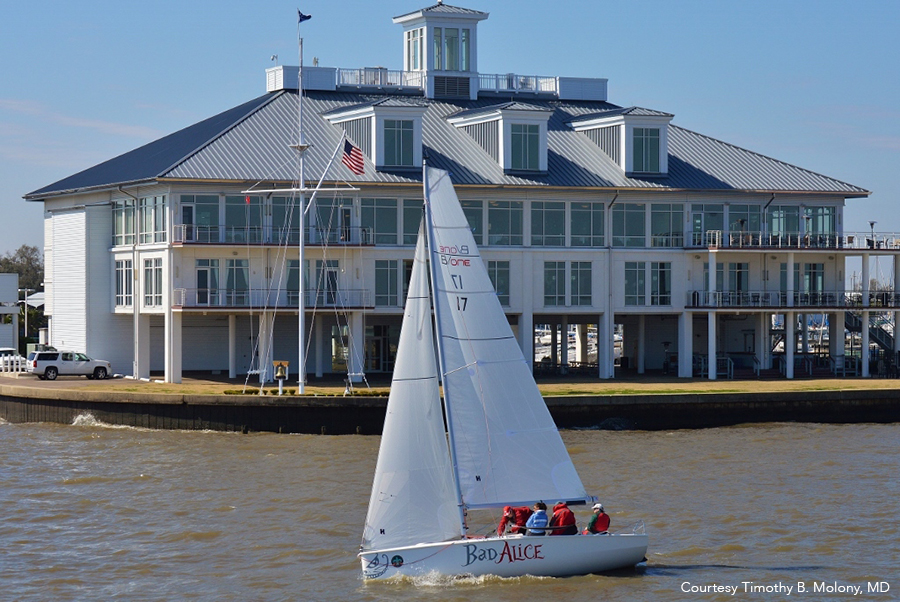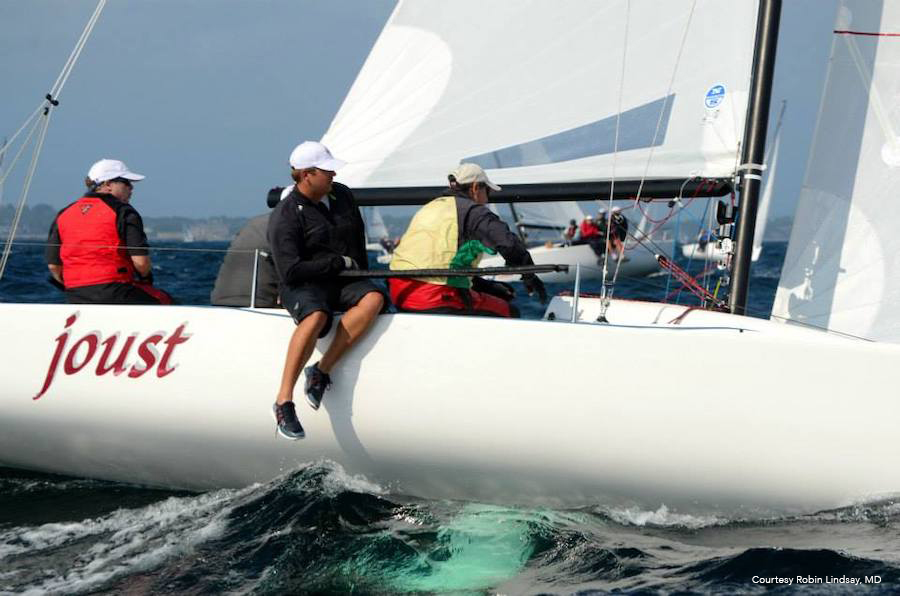
Dr. Molony’s J/70 keel boat “Bad Alice” cruises along the shores of New Orleans’ Lake Pontchartrain, yards from the stately Southern Yacht Club.
Now, I have a J/70 keel boat named Bad Alice after our first ragdoll cat who was kind of an alpha cat, and a high-performance racing trimaran named Stella after my son’s ragdoll cat. Those are my two current racing boats.
Explore This Issue
July 2023Q: Does sailing ever become a family affair for you?
A: My 29-year-old son, Henry, races with me pretty much all the time. He’s a mechanical engineer who works on the Gulf Coast, so he comes in for sailing on weekends. My older son, Christian, is going to be graduating soon [as of the interview date] with a pediatric residency from Texas Tech, and he’ll be starting his endocrine fellowship this summer.
Q: Can anyone who loves to sail become a racer? What does it take?
A: Just sailing around is fairly easy to do, but to sail a boat fast, you have to be very focused. Racing a boat is somewhat like flying a high-performance airplane: You must keep the vessel oriented precisely to the wind. This takes great powers of concentration. At the same time, you have another group of competitors trying to do the same thing as you, get from point A to point B in the fastest fashion. So, you’re meeting with other boats in close quarters. You need knowledge of some complex rules and complex tactical situations with their own advantages and disadvantages. Meanwhile, you’re surveying the wind and weather and continuously forecasting what’s going to happen. Basically, you’re out on the water constantly processing information and trying to take the best advantage of it.
Q: Yacht racing sounds like it has a steep learning curve. Is that true?

Olympic silver medalist John Lovell joined Dr. Molony’s crew at the 2014 J70 World Championship race on Rhode Island Sound. They finished in the top 10 out of 90 competitors.
A: It’s like anything else you learn, whether it’s ear surgery or it’s yacht racing—we are born with none of it. It all has to be learned. In my professional life, I’ve had some of the greatest teachers, like Dr. Brackmann. To have the opportunity to train with somebody like that is incredible.
It has been the same with sailing. One of my best friends is Johnny Lovell, who won a silver medal in sailing at the Olympics; he sailed with me at the World Championship, and that was an incredible experience. So, when you get to train with and learn from people at the top of their game, it’s an amazing thing.
Q: Do you find any similarities between yacht racing and practicing medicine?
A: There are several similarities. Racing, the way I do it, is a team endeavor, as is practicing medicine. Everyone on the team has their role for which they’ve been properly trained. Everyone is focused and clear on what needs to be done at every step. There needs to be a team leader or skipper to make it all work. When you’re leading in the operating room, you become like the captain of the ship. You make sure that everything is ready to go and that everyone is in the right place and on the same page so you can get the job done efficiently and in the proper fashion.
Racing, the way I do it, is a team endeavor, as is practicing medicine. Everyone on the team has their role for which they’ve been properly trained. Everyone is focused and clear on what needs to be done. —Timothy B. Molony, MD
And you don’t get that cooperation and team atmosphere like that by being mean to people, because then they won’t want to work (or sail) with you. You want people to be enthusiastic about getting the job done and ending up with a winning result, for your team or for your patient.
Q: How important is it for physician–surgeons to have outside interests?
A: Clearly, there are people out there who live for their work, and that’s fine. But I do think most of us need some outside interests, whether it’s fishing or traveling or going to the opera, to keep us sane. I feel that having something physical—if it’s something outside in nature, so much the better, because doing what we do, we spend so much of our time indoors—is a huge stress reliever. Sailing is that stress reliever for me.
Q: Do you actively encourage other people to take up sailing, if not racing?
A: For the yacht club, I try to talk to young families and say we’d love to have them come in as members. I tell them, “The question is, what do you want your kids to learn how to do? Yes, it’s wonderful for them to play baseball or football, but are they going to be playing it when they’re 30? Are they going to be running around the soccer field in their 40s and 50s when their knees are giving out? Golf, tennis, and sailing are lifelong sports.”
And that’s so true. I tell them how one of my best friends is a rheumatologist who recently turned 80 years old, and he still goes out on the racecourse with his daughter—she was on the sailing team at Boston College—and they’re giving me fits during the races!
Linda Kossoff is a freelance medical writer based in Woodland Hills, Calif.